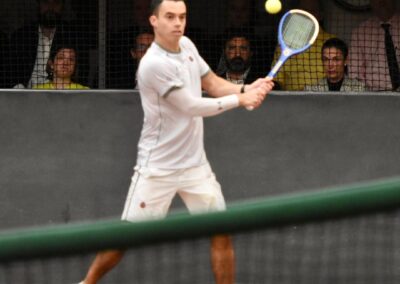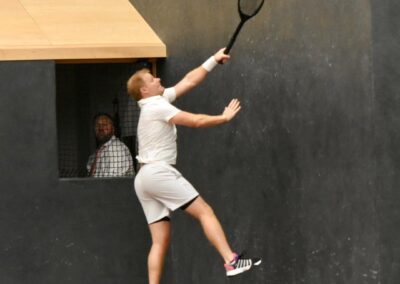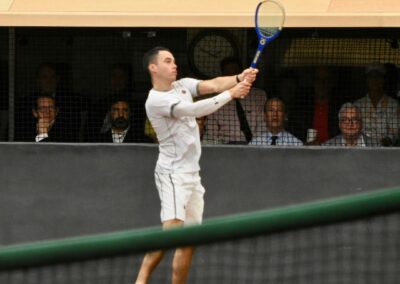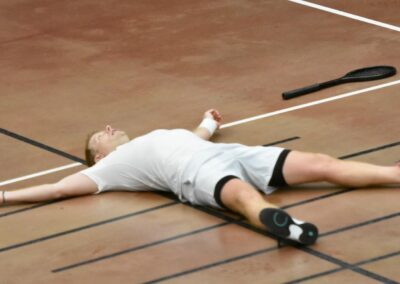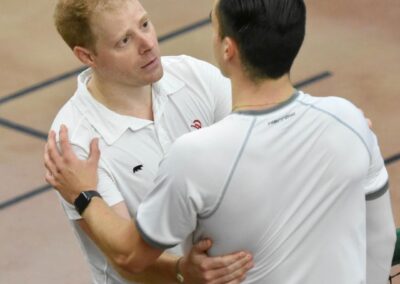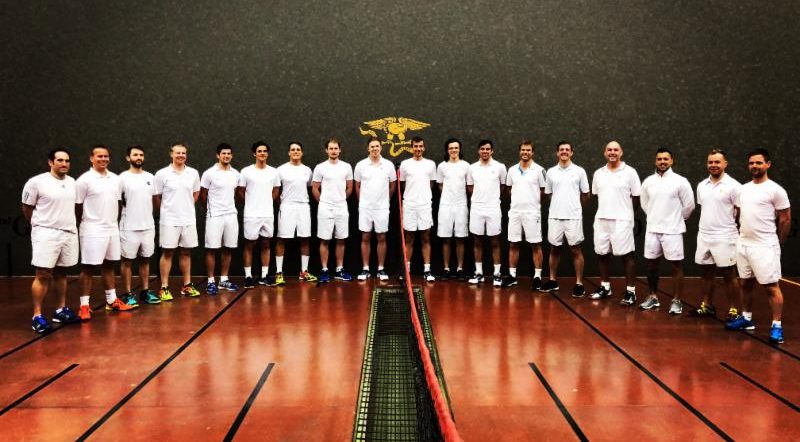by James Zug
Day Three
Riviere won 6-5, 6-3.
Riviere won the 2023 World Championship seven sets to two: 6-4, 6-2, 6-3, 6-4, 4-6, 6-3, 5-6, 5-6, 6-5, 6-3
The air-conditioned atmosphere at Westwood Country Club could not possibly mask the tension as Day Three unfolded.
The unofficial odds, emerging across the pond, had tightened considerably. Before Day One, Camden Riviere was 1/10 to win while John Lumley was 33/1; and the Challenge finishing in two days was 8/11. Before Day Three, Lumley was getting 20/1 to win 7-6 and 25/1 to win 7-5. It was even just 33/1 for the match to go to 5-5 in a thirteenth set.
The players came out looking relatively fresh. Lumley initially didn’t have his right thumb taped (he added tape at 2-all in the first set of the day). He still had his collarless shirt. Riviere was wearing his third different pair of sneakers—gray K-Swiss boots accented with pink (perhaps he knew what all cognoscenti know, that pink was the preferred color on any Day Three). Riviere was looking vital and refreshed, despite the various aches and pains, including a nasty blister on his left foot’s big toe—a reminder of the inevitable wear and tear that comes with a Challenge (it recalled last year at Prested and how Rob Fahey’s toenails were coming off under the stress of the Challenge).
The crowd seemingly had shifted a bit towards the champion. There were a few more Westwood faithful, Aiken in full flow and it was louder. They cheered in between a first and second serve. They cheered when Riviere won a point. At the same time, the Lumley cohort, missing some exuberant voices during the first set, were not as emphatic.
Throwing his head up like a war horse at the sound of a bugle, Riviere was buoyed by the support. He yelled “C’mon” after winning key points, he hopped from foot to foot before receiving and he sometimes double fist-pumped, knees bent, looking not dissimilar to Tiger Woods after sinking a crucial putt.
After eight sets, the tactics finally changed. The serving was the same, a steady diet of railroads. Both players served better, although both players faulted more on the first serve. More interestingly, Lumley announced his new intentions toward openings by trying to force on the first point and smacking a ball into the dedans later in the first game. Instead of trying to almost always play the floor, he began to go from A to B without inventing letters in between. He totted up six dedans in the ninth set, more than he had in total on Day Two. Nonetheless, Riviere was naturally adept at fending off balls rocketing towards the netting. After all he had years and years of practice playing Fahey. And even when he let it fly past, it worked out: at one point Lumley forced for the dedans, it crushed into the bandeau and as it sped in the opposite direction Riviere waved his racquet at it and skillfully dropped it for a winner under the grille.
Tactics-wise, Riviere was for the first time content to take gallery chases in order to switch sides and gain the serve. This was new. But necessary: in Day Two, Lumley had served 169 times, while he had served just 124 times.
The ninth set started out with balls flying. A long, eleven-minute game ensued at 1-1. Then from 2-all, Riviere got slight breathing room. He was playing freely, with confidence, crunching balls into the grille (seven in total for the set). A love-game at 3-2 and going up 30-0 at 4-2. Then some unforced errors, a few incredible gets by Lumley on balls that seemed dead to rights and his lead disappeared. At 4-4, he had trouble finishing off the game, but on his third game ball he got it.
The ninth set was clearly key. The galleries believed that whoever captured the set would in all likelihood take the entire match. Riviere squandered two set points at 5-4 as Lumley recovered to take the game by crunching a service return off a loose railroad straight into the dedans.
5-5. The third 5-5 set in a row, something all but unheard of in a Challenge. Four points finished in a minute. After slowing down his railroad, Riviere won the first point with a wraparound tambour. Two points in a row, Lumley crushed a return towards the dedans and Riviere stopped it but couldn’t get it back over the net. Another Riviere volley off a Lumley return and it was 30-30. Lumley forced again for the dedans off the next railroad; Riviere volleyed it back but gave Lumley an opportunity for a gallery. Then Lumley got chase two.
Switching sides. Lumley earned his first set point after a nifty volley into the tambour. Chase two—pretty impregnable. Riviere, ever bold, volleyed Lumley’s railroad, with his two-handed backhand (both players often did that with their backhand volleys), cutting it towards the main wall and Lumley couldn’t get it back. Amazing. Lumley got a second set point right away. Chase worse than two. Switching sides.
Lumley couldn’t get enough cut on his return and lost the chase by a wide margin. Lumley then laid down two chase, last gallery and three yards. Lumley flicked a backhand into the grille: thus a third set point, serving, and chase three yards.
Again, just like a few minutes before: Riviere volleyed Lumley’s railroad crosscourt and Lumley couldn’t dig it out, Riviere beating the chase, but barely, at worse than two. Extraordinary.
Riviere got a nick for a chase, and advantage when one of his floating backhands hugged the gallery wall. But on Riviere’s first set point, playing off chase three, Lumley peppered his backhand, hitting the ball six times, and then calmly stroked a ball too tight on the main wall. Extraordinary again.
The third deuce. Riviere pumped a volley into the grille. Then he did it again. And the ninth set was suddenly his. It was a magical moment at the end of a magical, fifty-minute set.
The tenth set. Lumley could have succumbed after the deflating end of the previous set. Instead, he fought on. Riviere dashed to a 3-1 lead, but Lumley bravely battled it back to 3-3. Riviere hit a behind-the-back ball at one point. It took twelve minutes to decide the sixth game, but it went, after both had game balls, to Lumley
Finally, it flowed for Riviere. An at-love game. The end in sight. Saving game balls at 4-3. At 5-3, Riviere, playing off a chase of two and three, lost the point. It would be the last one he would lose of the championship. At 40-15, they switched sides. Lumley, defending a chase of better than two, hit a poor railroad that came off the penthouses. Per usual, Riviere smacked his two-handed backhand volley crosscourt, and Lumley couldn’t dig it out. Riviere collapsed to the ground at hazard a yard, splayed out, this third title finally in hand.
The summit of Everest is marine limestone. That is a perfect sentence. Camden Riviere is world champion. That is another.



